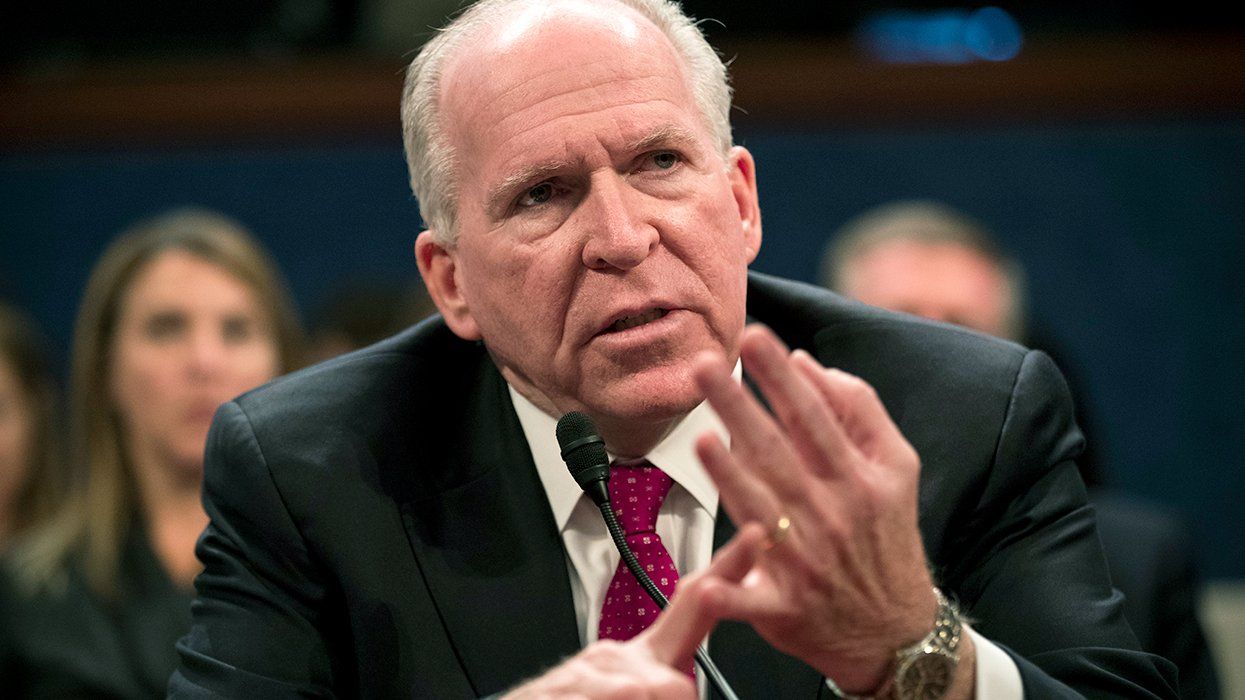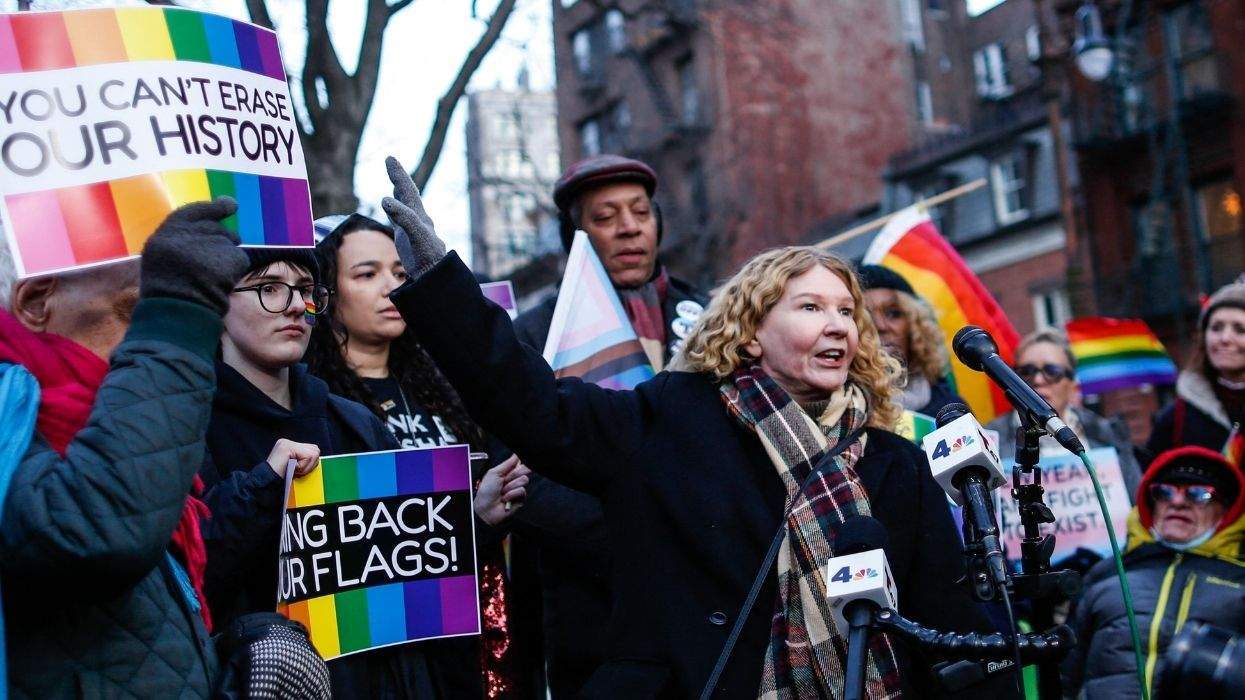FBI Director Christopher Wray testified Tuesday to the Senate Homeland Security Committee about the rise in worldwide terror threats, particularly since Hamas launched its terrorist attack against Israel last month.
"We assess that the actions of Hamas and its allies will serve as an inspiration, the likes of which we haven't seen since ISIS launched its so-called caliphate several years ago. In just the past few weeks, multiple foreign terrorist organizations have called for attacks against Americans and the West," Wray said.
The Federal Bureau of Investigation says its "most immediate concern" is domestic terrorism inspired by the conflict in the Middle East.
"This is not a time for panic," Wray added. "But it is a time for vigilance."
Domestic terrorism and extremism continue to be the top threat to U.S. homeland security, according to all federal intelligence and national security agencies, including the FBI, the Department of Homeland Security, and the CIA.
Wray said that one of the biggest threats is posed by lone actors or small cells of individuals who typically radicalize violence online and who primarily use easily accessible weapons to attack soft targets. These extremists "are often motivated and inspired by a mix of social or political, ideological and personal grievances against their targets," Wray said.
The confluence of threats makes this another of one of the most dangerous periods for the United States in recent history. “I think through the course of recent history over the last several decades, there have been periods when the terrorist threat has increased significantly,” former CIA Director John Brennan told The Advocate in an interview. “I think back to the 1980s when there was a real serious threat from Hezbollah against U.S. interests in the Middle East and the bombing of our embassy in Beirut as well as Marine Corps barracks and the al Qaeda attacks.”
Terrorist groups like al Qaeda can be energized by U.S. policy developments and U.S. presidents, Brennan said. “If you look at what's happening right now in Gaza between Israel and the Palestinians, clearly there has been a growth of Palestinian extremism, militancy, and terrorism as a result of years of feeling ignored.”
The conflict in Gaza may go on for some time, he said: “I fear there's going to be more death and destruction in Gaza, and I'm hoping that this is not going to expand to a regional conflict, which will have real global implications.”
The Hamas attack in early October left more than 1,400 Israelis dead. About 240 hostages remain taken by Hamas. In the conflict, more than 9,000 Palestinians have been killed in Gaza by Israeli operations.
Brennan hopes that the bloodshed that has occurred in Israel and Gaza will prompt the international community to form some type of trusteeship or support system for the region. “The Palestinians' quest for statehood has been denied for too long, and as long as this continues to fester, you're going to have these terrorists and militants among the Palestinians continued," he said. "To be ascendant and to use violence, but it's going to require, I think, a more modern government. In the meantime, this escalation of violence has also increased the threat of foreign terrorism.”
Closer to home, in recent years, Brennan noted, the United States has seen a growth in domestic terrorism and extremism, as some groups have resorted to intimidation and violence in order to pursue their political, partisan or ideological agendas. “What I find different now is that the polarization that exists within the United States is really fueling this anger, this sentiment,” he observed. “And what's most disturbing is when public officials and those who have an impact in terms of people's views are fueling these sentiments, which result in what happened on January 6, 2021.”
Brennan pointed out that former President Donald Trump and others incite people to use violence to pursue their goals, and this overlaps with what’s happening in the Middle East. “So you have now an increase in tensions overseas that have a U.S. dimension to it, because of our very close support and identification with Israel, and at the same time, you have this domestic landscape that tends to fuel violence by some individuals.”
The former CIA director is particularly concerned about white supremacist and other right-wing groups that are domestically bred and are willing to use violence to try to support their ideological goals. “I think that's why FBI Director Wray [Tuesday] spoke very prudently and clearly about the concerns that the bureau has about how some of these tensions nationally and domestically could lead to different types of violent attacks against U.S. interests, whether it be abroad or at home,” Brennan said.
These groups are obviously paying attention to the difficulty the House had in electing a speaker or passing any significant legislation. When these groups see dissension here in the United States, does that send a signal that the United States is weaker and more susceptible to being attacked?
“I think certainly some foreign actors try to increase divisions inside the United States because the more dysfunctional we are, as a government and as a society, the more divided we are, and that tends to be in the interests of our adversaries around the globe,” Brennan cautioned. “And so I do think that there are opportunities for these bad actors to try to exploit the domestic situation here and to even encourage it.”
Brennan said that stopping or slowing down these threats means public officials need to stop fanning the flames of hate. “I am very disappointed in our public officials who tend to fuel these fears, anxiety, and sentiments. Unfortunately, the MAGA base tends to be a very ideologically driven, and they are very determined to pursue their agendas.”
As an example of these dangerous ideologies, Brennan pointed to the new speaker of the House, Mike Johnson.
“He has had very strong ideological views, and he is basically a Christian nationalist. He’s also held very dangerous anti-LGBTQ positions over the years. I think the irresponsible and very wrongheaded views and policies of a lot of people and the Congress are just furthering this domestic agitation. They're playing to these very bigoted sorts of sentiments that exist, unfortunately, within our society.”
Reversing this trend, Brennan said is going to take getting people into public office and other positions of authority and influence, who are going to represent what he considers the true values of this country, which are tolerance, acceptance of diversity, and a willingness to be able to coexist with people of all different backgrounds, religious faiths, sexual orientations. Unfortunately, he said, there are also many people who are bigoted.
Did Brennan think this stoking of divisions would inhibit the United States' ability to respond to another major terrorist attack, like 9/11? “The United States is much less hospitable to foreign terrorist groups and less vulnerable to them than it was on 9/11,” he emphasized.
“There's been a lot of progress made including better cooperation among defense, intelligence, law enforcement, state, local, and federal agencies. But after the 9/11 attacks, this country did come together, and it rallied behind the government and President Bush. Unfortunately, the Republican Party of 2023 is far different than the Republican Party of 2001. And I thought that after the insurrection took place on January 6, that the Republicans were going to come to their senses. But most of them just reverted to their support for Trump and MAGA. And I do worry that, again, these divisions that have been fueled by these politicians really undermines our ability as a country to come together during a crisis.”
When asked about the LGBTQ+ community coming under attack by domestic terrorists and MAGA, Brennan was quick to defend. “The LGBTQ+ community is very important to me, and one that I think, unfortunately has suffered in terms of prejudice, bias and harassment over the years, especially recently. I am very disturbed about some of the recent trends that I see coming from the right wing that seeks to reverse some of the important gains that the LGBTQ+ community has experienced as well as other communities that have been subjected to similar types of actions, and again, it’s about putting people in positions of power who represent the true values of our country.”
Then, what happens if Donald Trump is elected president next year? “It's going to shake the foundations of our democracy to the core,” Brennan responded emphatically. “And it's going to have national security implications, domestic implications that are going to be very, very detrimental to this country's security, prosperity, and democracy. It's something that I fear, and he is somebody who never should have held office before. And I certainly hope will never hold office again.”
Did Brennan think U.S. intelligence agencies are making plans for the eventuality of Trump being the Republican nominee as well as if he is elected president again? “The appropriate law enforcement agencies, in the run-up, to the elections will try to make sure they do whatever possible to prevent any types of outbreaks of violence either before or after the election. But I do believe that the professionals and the intelligence and law enforcement agencies will do their very best to try to protect their institutions. These are the institutions that keep our democracy strong and sound.”
















Charlie Kirk DID say stoning gay people was the 'perfect law' — and these other heinous quotes
These are some of his worst comments about LGBTQ+ people made by Charlie Kirk.